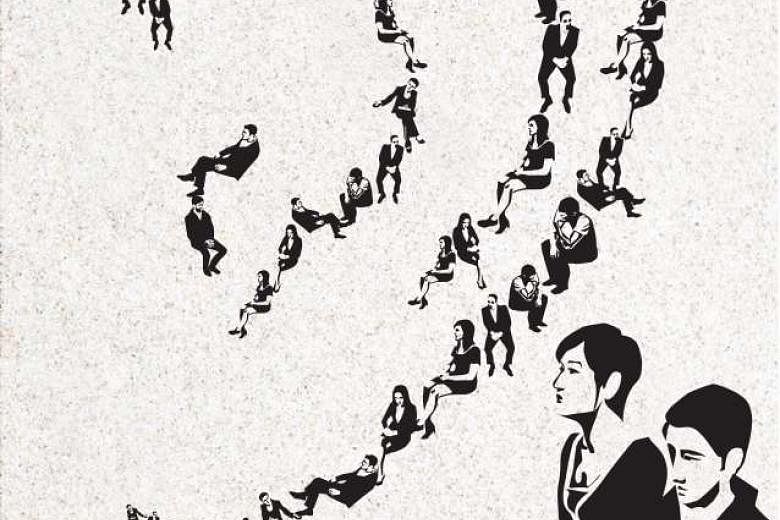Over a few days last month, my husband and I shared the crests and troughs of our marriage with a roomful of strangers.
Just the idea alone is usually enough to give me sweaty palms.
I am shyness personified and sometimes wonder if I might become the first person to collapse and die from public speaking anxiety.
My privacy concerns also border on paranoia, which explains my barren social media life save for a (dormant) Facebook account. Sharing the minutiae of my life and learning the same about others is just not my thing.
But I ejected from my comfort zone because of our commitment to a church ministry, which aims to build stronger marriages through better communication skills.
Called Worldwide Marriage Encounter, the enrichment programme is rooted in Catholic teachings, but has drawn married couples of all faiths and ages in nearly 100 countries for more than 50 years.

It involves a stay-in weekend course that gives couples the tools, space and time to engage in honest dialogue, even on potentially thorny issues.
This is how it works: A priest and three couples helm each retreat and take participants through a series of talks on various topics. These range from examining how our attitudes and behaviours can affect our marriage to dealing with practical issues such as finances.
After each talk, couples are given time to reflect and dialogue in private, guided by a few techniques and principles.
My husband and I had attended one such weekend five years ago, found it meaningful and were later roped in as presenters.
So for several months last year, we laboured over our talks, detailing our emotions and experiences relating to the assigned topics and a given format.
Then we spent a few more months slowly reworking them under the guidance of a very sweet mentor couple.
We finally joined a presenting team last month as rookies and talked to the 17 couples who had signed up for that round.
I was, as expected, a bundle of nerves, my mind teeming with trivial concerns.
First, I spent way too much time thinking about what to wear.
Then I fretted over my delivery: Too soft? Too fast? Too jerky?
Most of all, I wondered what value the participants could possibly draw from our stories. Why would 12 years of marriage entitle us to speak with authority or wisdom? What made us the experts?
I didn't think our mundane struggles - clashing approaches to child discipline; resentment over having to give up a career (me); going home to a frosty spouse after yet another long day at work (him) - would interest anyone, much less benefit them.
Scores of other couples had traversed far more dramatic peaks and valleys that would yield deeper insights and richer lessons.
Riddled with doubts, I struggled to find my rhythm.
Then came a quick debrief with the other two presenting couples on the second day. We swopped observations of how certain parts of various talks had resonated with different participants.
There had been smiles, nods, nudges and even tears here and there. Somewhere, somehow, we had made an emotional connection with some people.
That was when the penny dropped. I was not there to give advice or answers - I had none. But I could serve as a foil, perhaps a conduit to renewed hope and understanding.
People don't always want expert tips or stock solutions when it comes to their personal lives.
Sometimes, just hearing the stories of those who are facing or have overcome similar or bigger issues brings comfort and courage.
It can help reset your emotional state, put your own problems in perspective and inspire you to tackle them with more vigour.
As one participant said during a break: "We both know what the issue is. But hearing it from a neutral party who has gone through the same thing makes it easier to broach the subject and talk about it more calmly."
I thought I was there as an act of service, but I gained more than I gave.
In an age of disposable marriages, it was touching to see couples dedicating one weekend to each other in a remote facility that no one would ever describe as romantic.
Whether they have been married for five or 25 years, have a web of tangles to unravel or just a wish to break the plateau, they were there for the same purpose: to make things work and work better.
Of course, there were a few who seemed like they would much rather be somewhere else. But the fact that they turned up at all, likely at their spouses' request, showed the desire to make their partners happy.
There were other encouraging signs at the three bridging sessions held after the weekend to reinforce the dialogue techniques couples picked up at the retreat.
Most rushed over after work. Some attended faithfully even when their spouses couldn't make it. Others described the positive changes they had observed in their partners, which made it easier to ride out the rough days and dulled the pain from the usual trigger points.
Seeing how they strove for healthy, hardy marriages was humbling and inspiring. They will go on to form a "love circle", meeting once a month to work and talk about a common dialogue question.
As their friendship deepens, the hope is that they will draw strength and support from one another to keep the flame alive.
The programme is not a magic pill. It is more a booster shot for working marriages than a last resort for unions in trouble.
But that hasn't stopped couples whose marriages are crippled by infidelity, addiction, unemployment or other grave issues from finding hope and healing.
Seasoned presenting teams sometimes share, among themselves, uplifting stories about couples who arrived in stony silence, sat through the talks leaning away from each other with their arms folded, then broke down on the last day and left, if not as lovers, at least as friends again.
At the end of the day, the retreat is much like your marriage: It can only be as good as what the two of you decide to make of it.
As a priest here who has counselled countless couples likes to say, love stands for "lots of voluntary effort".
We are taught that love is an action, not an emotion.
It is not a rush of feelings that ebbs and flows, but a conscious decision we make daily, even when the other party is unlovable.
It's not always easy. But isn't your marriage worth fighting for?


